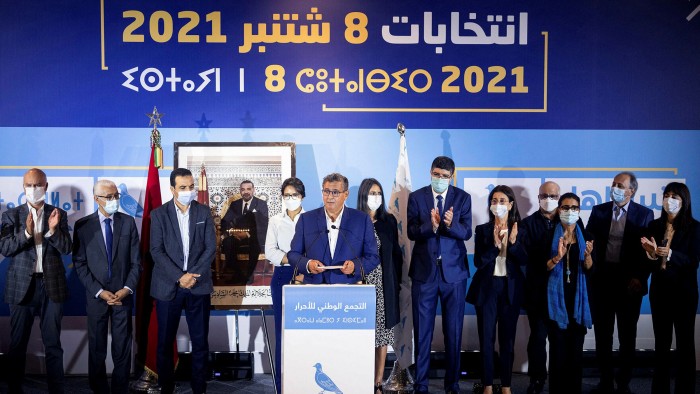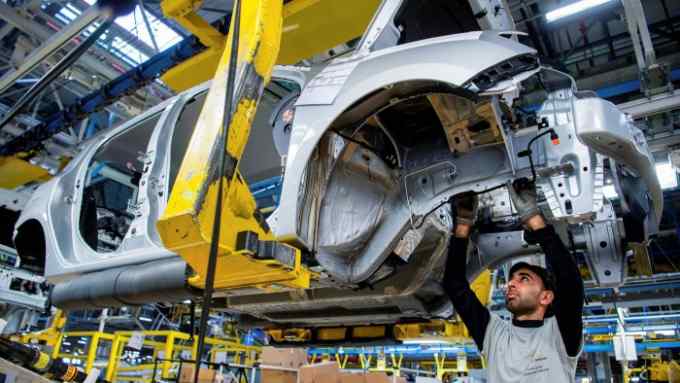Critics flag opposition weakness in Morocco’s new parliament

Simply sign up to the Middle Eastern politics & society myFT Digest -- delivered directly to your inbox.
The massive election defeat in September of Morocco’s moderate Islamist Party of Justice and Development — which had led its government for a decade — marks the end of an era that began amid the Arab uprisings in 2011.
To reduce the risk of unrest as the region’s pro-democracy protests extended to Morocco, King Mohammed VI ceded more powers to the elected parliament, although ultimate control remained in his hands.
Appointing an Islamist party to lead the government would have been unthinkable before 2011 but, as under concessions set out in an amended constitution, the king committed to choosing a prime minister from the biggest party in parliament.
More recently, however, as voters and royal circles turned against the Islamists, the government has reverted to parties close to the palace, signalling even more royal control of policy, some observers say.
“It is like we have gone back to before 2011,” says Mohammed Masbah, head of the Moroccan Institute for Policy Analysis. “A page has been turned. The Islamists are not just outside power, they are outside the game. With the number of seats they got [13 of the 395] they have become irrelevant.”
The new prime minister is Aziz Akhannouch, an oil importer, billionaire businessman and member of the elite, whose National Rally of Independents (RNI) party swept to victory in last month’s polls.
Some analysts argue Akhannouch, who has been agriculture minister since 2007, and his RNI colleagues, who include several businessmen, will be able to launch reforms to improve the investment climate.
Critics, on the other hand, are concerned about the weakness of opposition within parliament. They also fear conflicts of interests arising from placing powerful members of the business community in charge of government.
“Pro-business parties are back — and that gives us hope that we will return to the more pro-reform 2011-16 stance,” wrote Charlie Robertson, global chief economist at Renaissance Capital, in a note after the election. He was referring to the fiscal reforms and subsidy cuts enacted by the first PJD government, some of which, he said, were rolled back by the party’s next government.
Other members of Akhannouch’s coalition are the Party of Authenticity and Modernity, founded by a friend of the king, and Istiqlal, an old nationalist party involved in the independence struggle against France. The coalition has a comfortable majority with 270 of the 395 seats in the assembly.
“There will be almost no opposition in parliament, which does not exist in any democracy,” says Masbah. “In Morocco, there was always a kind of balance — even if the opposition was weak. We will have a very strong government that can get through any law, and it will include businessmen with major interests.”
The new prime minister has promised to create 1m jobs to revive the economy after the pandemic, via a public works programme and support for entrepreneurs.
The PJD has alleged irregularities in the election, which has been denied by the interior ministry. Observers say the deep-pocketed RNI was able to deploy patronage networks of local notables in the countryside to ensure it got the vote, a usual practice in Morocco.
Even so, some say that, after 10 years leading the government, the PJD had lost popular support — even among its core Islamist constituency — and that its defeat at the polls was a genuine reflection of perceptions that it was ineffective and unable to fulfil earlier election promises to stand up to corruption and autocracy.
“They appeared to be clearly unable to manage the economy, and they lacked the will to push a democratic interpretation of the constitution,” says Karim Tazi, a businessman. “Their only preoccupation was to be accepted by the palace and they did not use all the powers they had.”
Analysts cite examples that alienated voters, including the normalisation agreement with Israel signed last year by Saadeddine Othmani, the PJD prime minister, in a quid pro quo for US recognition of Moroccan sovereignty over the disputed territory of Western Sahara.
More from this report
Pandemic exposes vulnerabilities in Moroccan economy
Morocco’s carmaking prowess a result of shrewd state planning
Morocco tourism struggles despite vaccine progress
Morocco asserts its power as diplomatic spats simmer
Moroccan lenders shore up small businesses but risks loom
Casablanca financial hub’s fortunes tied to national economic strategy
The disappearance of opposition in parliament also comes against the backdrop of a crackdown on the expression of dissent in recent years that has seen several independent journalists jailed after prosecutions for sexual crimes.
Human Rights Watch described the rape trial of Omar Radi, an investigative journalist, as an abuse of the justice system “to silence one of the few remaining critical voices in Moroccan media”. He was sentenced in July to six years in prison.
Moroccan officials have said that no one is tried for expressing views and those prosecuted had broken the law.
Omar El-Hayani, an elected member of the local council of Rabat, the capital, representing the Democratic Left Federation, says the absence of opposition and the crackdown on media could threaten stability.
“The danger is that opposition moves to the street. There will be people who will oppose the liberal economic reforms the government will undertake. Or we could see more actions like the boycott of 2018 ,” he says.

Comments